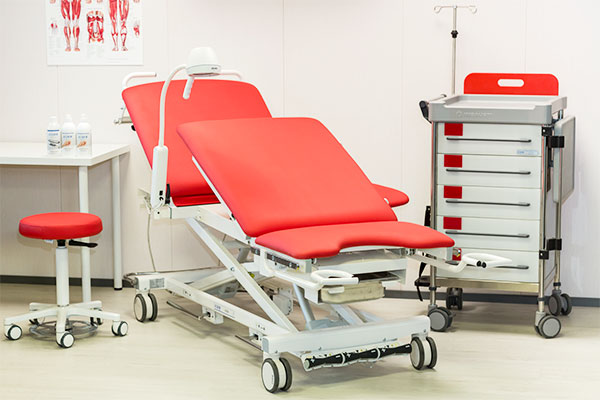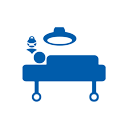
Coating destroys the coronavirus by over 90 per cent within an hour
The coating used by Lojer received ISO certificates.
Preventing the spreading of the coronavirus plays a key role in controlling the pandemic. The upholstery material of antimicrobial furniture of the Finnish manufacturer of medical furniture, Lojer, has proven to be highly effective in tests for destroying the coronavirus. The advanced coating technology used in the upholstery has received ISO certifications, which constitute proof of the materials’ ability to destroy viruses or prevent their growth.
The Future upholstery material, which is part of Lojer’s antimicrobial product range, uses a coating technology that has been granted the international ISO 18184, ISO 21702 and ISO 22196 certifications. They measure for example the ability of textiles and plastics to destroy viruses or prevent their growth. Receiving the ISO certifications requires continuous monitoring and testing by external, independent test laboratories.
Tests proved, among other things, that already within one hour of contact, the upholstery material had destroyed almost 93 percent of the viruses, and at 90 minutes, already over 95 per cent. Furthermore, the activity of the coronavirus was reduced by 99.9 percent 24 hours after it was exposed to the surface material.
“Certifications confirmed the efficiency of antimicrobial solutions against coronavirus, as well. Hygiene is always important in health care, but during the corona pandemic, in particular, its significance is emphasised,” says Susanna Ranta-aho, Product Development Specialist at Lojer.
The Future upholstery material can be used for example in examination tables, medical chairs and physiotherapy and massage tables. The coating technology used for Future is developed by a long-term cooperation partner of Lojer.
The antimicrobial effect lasts the entire life of the product
Another efficient coating material in the fight against the coronavirus and other infections related to treatment is the epoxy powder coating used by Lojer, which receives an antimicrobial property through additives with the help of the BioCote® technology.
“According to studies, the number of certain microbes, such as MRSA and bacterium coli, was reduced by 99.5 percent in two hours and 99.9 percent in 24 hours on BioCote® surfaces. The BioCote® technology has also been tested against the coronavirus: the virus strain was reduced by up to 90 percent in two hours,” says Ranta-aho.
The antimicrobial properties of all Lojer antimicrobial products remain throughout the whole life cycle of the product, and cleaning the surfaces does not reduce the efficacy of the properties.
Lojer is a part of the Finnish HygTech Alliance
The Lojer antimicrobial solutions reduce infections related to treatments. The antimicrobial upholstery and surface materials and touch-free features improve the safety of both health care professionals and patients.
Together with other five Finnish companies – Oras, Isku, Abloy, Teknos and Korpinen – Lojer makes up the HygTech Alliance, which develops holistic solutions and products to reduce infections in hospitals and in other environments.
Further information about the ISO standards and tests used
ISO 18184
- an antiviral textile test that measures virucidal antimicrobial activity on textiles and other porous materials
- The virucidal effect of the coating technology, used for the Future upholstery material, against the coronavirus is almost 93 percent within one hour of contact and over 95 percent after 90 minutes
- feline coronavirus was used in the testing. It belongs in the same Coronaviridae family as SARS-Co
ISO 21702
- an antimicrobial surface test that performs the measurement of antiviral activity on plastics and other non-porous surfaces
- designed to test the ability of surfaces to destroy viruses, which have come in contact with the surface of the coated material
- the activity of the coronavirus is reduced by 99.9 percent in 24 hours after being exposed to the coating of the Future upholstery material
- feline coronavirus was used in the testing. It belongs in the same Coronaviridae family as SARS-Co
ISO 22196
- an antimicrobial surface test that performs the measurement of antibacterial activity on plastics and other non-porous surfaces
- designed to test the ability of plastics and other similar materials to kill or prevent the growth of microorganisms, over a 24 hour period
- the reduction of antibacterial activity on the surface of the Future upholstery material is R ≥ 2, which corresponds to the reduction of 99%
- the testing was conducted with the following bacteria: Staphylococcus aureus, resistant to methicillin Staphylococcus aureus (MRSA), Escherichia coli, Klebsiella pneumonia
- On a surface treated with the BioCote® epoxy powder coating, the number of microbes (S. aureus and E. coli) is reduced by 99.5 percent in two hours and by 99.9 percent in 24 hours, and the amount of the coronavirus by up to 90 percent in two hours
- The same feline coronavirus was used in the BioCote® testing as in the testing of the coating technology used for Future

 Akutt og øyeblikkelig hjelp
Akutt og øyeblikkelig hjelp Fødeavdeling
Fødeavdeling Sykehusavdelinger
Sykehusavdelinger Sykehjem
Sykehjem Hjemmepleie
Hjemmepleie Poliklinikker
Poliklinikker Fysioterapi
Fysioterapi Kirurgi og
Kirurgi og Veterinær
Veterinær